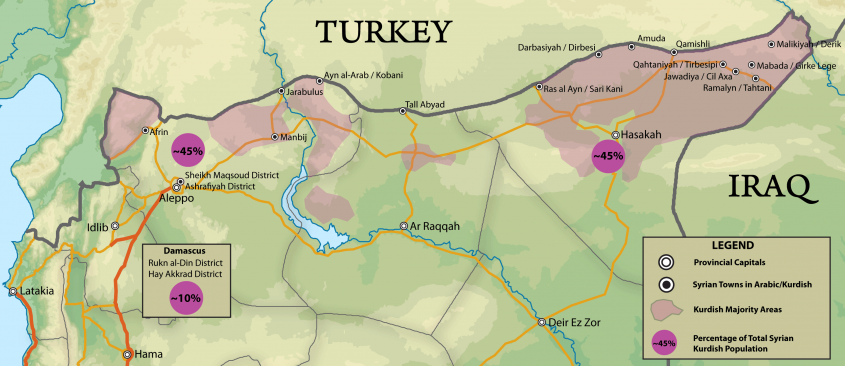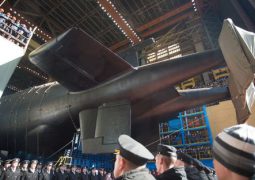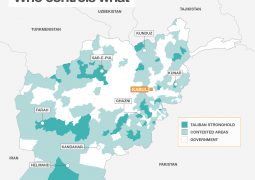U.S. Split Over Plan to Take Raqqa From Islamic State

Trump administration officials are split over strategy for pushing militant group out of its Syria stronghold
U.S. hopes of capturing Islamic State’s Syrian stronghold of Raqqa have become entangled in an intense debate over the offensive that is threatening to delay key decisions for weeks, according to U.S. officials.
The Trump administration is facing internal divisions over the strategy for pushing Islamic State out of Raqqa without alienating Turkey, a vital North Atlantic Treaty Organization ally that opposes America’s ongoing work with Kurdish fighters in Syria that Ankara views as terrorists.
Because of Turkey’s opposition, the new administration may not finalize its plans for taking Raqqa until Turkey votes April 16 on a referendum that would give President Recep Tayyip Erdogan sweeping powers, according to U.S. officials involved in the internal debate.
“Everything is red hot,” said one senior administration official involved in the debate.
While the debate in Washington continues, rival forces in Syria are jockeying for position on the battlefield in an effort to expand their influence. That has created a dangerous flashpoint at the northern Syrian town of Manbij, where Russian and American forces are within striking distance of each other. Russia is the Syrian regime’s most powerful ally.
At a Senate hearing on Thursday, Sen. John McCain (R., Ariz.) expressed concern about the situation in Syria.
“I think there’s a possibility of an impending conflict between Turkey and the Kurds, as opposed to us working together to try to defeat ISIS and remove them from Raqqa,” Mr. McCain said to Gen. Joe Votel, head of U.S. Central Command, which oversees the fight in Syria.
“We are trying to take actions to prevent that from occurring,” Gen. Votel said.
Pentagon officials said Thursday that the military has moved the first of what could be hundreds of Marines into Syria, where they would provide artillery support for ground forces preparing for the assault on Raqqa.
A central unresolved question is who the U.S. should work with to push Islamic State out of Raqqa. Some U.S. officials are pressing the White House to re-evaluate America’s close military ties with the Kurdish fighters in Syria as a way to assuage Mr. Erdogan. Others want the U.S. to work with Kurdish forces to take Raqqa, but then consider handing control of the city over to a local council sympathetic to the Syrian regime and its Russian backers.
“There’s not anything near an agreement or a plan,” said a senior U.S. military official. “It’s up to the White House.”
The Turkish prime minister, Binali Yildirim, said Thursday that Turkey was waiting for the U.S. decision about its strategy and choice of partner for the battle for Raqqa, and warned that bilateral relations would suffer if U.S. support for its Syrian Kurdish partners continued.
Another senior administration official said it likely will be weeks before President Donald Trump makes a decision. Part of the delay is due to an effort to determine how the strategy in Raqqa fits into the broader fight against Islamic State in Iraq, Syria and beyond. Iraqi forces have pushed deep into western Mosul in recent days, shrinking the territory held by Islamic State in its last major stronghold in Iraq.
“It’s got to be connected to the larger campaign,” the official said, adding that officials are trying to determine “how you completely integrate the strategy.”
The issue of Kurdish fighters is “among many issues that have got to be worked out,” the official said.
Last week, Defense Secretary Jim Mattis sent the White House his 30-day review of the strategy for fighting Islamic State. Hopes for a quick decision from Mr. Trump have given way to a growing realization that the debate is unsettled.
“The aim is there to take Raqqa quickly, but we’re all waiting for Washington to move forward on a plan,” said a senior European diplomat who is part of the “Friends of Syria” alliance, a coalition of 11 Western and Arab countries led by the U.S. that once opposed Syrian President Bashar al-Assad’s rule, although some members have softened to the Syrian president as he has recaptured territory over the years.
Despite Turkey’s objections, the Obama administration pressed ahead with a military strategy that relies heavily on the Kurdish force, known as the YPG, that is working with U.S. special operations forces to encircle Raqqa. The YPG and its Arab allies are now less than 6 miles outside of the Islamic State stronghold as they await word from Washington on the new strategy.
Inside the Trump administration, one faction is pushing the White House to directly arm the YPG, a move that would antagonize Mr. Erdogan.
Another faction is struggling to find ways to allay Mr. Erdogan’s concerns about America’s work with the Kurdish forces. In one effort to do so, some administration officials are urging the White House to re-evaluate America’s relationship with the Kurdish fighters after the fight for Raqqa.
Untangling American ties with the YPG could be difficult. The U.S. currently has hundreds of special operations forces working with the Kurdish fighters in Syria, where they control 20,000 square miles of territory.
And finding an alternative fighting force in Syria has repeatedly failed. Pentagon and Central Intelligence Agency programs to arm and train Syrian rebels have fallen flat.
U.S. officials are skeptical of Turkey’s longstanding vow to send in its Syrian proxies to take Raqqa, yet agree on the need to have a Sunni Arab force play a central role in taking and governing the city after Islamic State is pushed out. But there is no agreement on who can take the job. That has raised the prospect of giving it to local forces sympathetic to the Syrian regime or its allies. Similar handoffs occurred with villages around Manbij last week, raising the prospect that could be a blueprint for Raqqa.
Meanwhile, the situation in Manbij has devolved into a dangerous proxy war.
With reluctant Turkish support, U.S.-backed Kurdish and Arab forces seized the city from Islamic State last summer. Turkey recently threatened to send fighters into Manbij, triggering a move by Russia and the Syrian regime to counter any possible advance.
The U.S. military has taken the unusual step of sending American forces into Manbij, where they are acting as a physical buffer between Turkish-backed fighters who have threatened to advance in Manbij, Syrian regime forces and the Manbij military council, which governs the city.
That has increased the risk for U.S. troops, who have been videotaped driving into Manbij with American flags flying from their armored vehicles.
“There’s obviously a degree of cautious concern, but I don’t see it as, ‘Oh my god, the alarm bells are going off,’” said the senior U.S. military official.
—Raja Abdulrahim in Beirut, Felicia Schwartz in Ankara and Carol E. Lee and Gordon Lubold in Washington contributed to this article.
- Previous Risks in Demonizing Diplomacy with Russia
- Next Court dismisses Anwar’s bid for physical contact during prison visits










